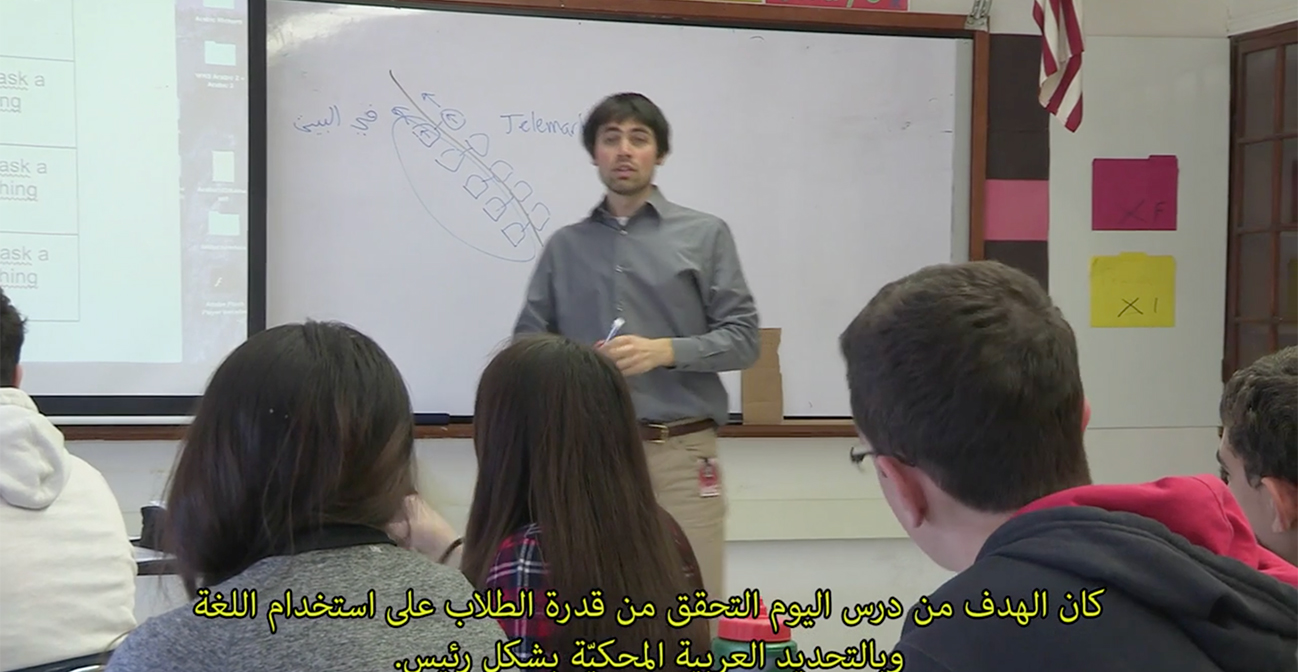Join us for conversations that inspire, recognize, and encourage innovation and best practices in the education profession.
Available on Apple Podcasts, Spotify, Google Podcasts, and more.

CLASSROOM AT A GLANCE
Teacher
Wael Fawzy
Language
Arabic
Grades
6
School
LaSalle II Magnet Elementary School, Chicago, Illinois
Lesson Date
April 6
Class Size
8
Schedule
45 minutes, 4 times a week
اضغط هنا للترجمة باللغة العربية
In this lesson, Mr. Fawzy’s sixth-grade class continues to learn about the weather in the Arab world and to practice speaking and writing using Modern Standard Arabic (MSA) infused with dialects. Mr. Fawzy begins by showing slides that describe the weather in Egypt and in Chicago. He asks students questions about the weather in each place and then has them develop questions of their own using different dialects they have been practicing. Next, the class is divided into two groups for a timed presentational activity. Each group member compares the weather in a picture they chose to the weather in an Arab country in the same season. Then students complete a worksheet, labeling eight different pictures using Modern Standard Arabic or a dialect with a brief description of the weather shown. The class ends with another writing activity. Students write down a question based on the weather and trade questions with another student. They will read the question and answer it at home.
Communication: Interpersonal, Presentational
Cultures: Practices
Comparisons: Cultural
dialect
A form of a language used among people who live in the same geographical area or who share the same social identity. While language instruction traditionally emphasizes a “standard” form of a language, to more effectively communicate linguistically and culturally, instruction should also incorporate dialect elements within the curriculum to reflect the actual/authentic ways in which people communicate day-to-day.
Foreign Language in the Elementary School (FLES)
This elementary school model organizes instruction around a scope and sequence taught by a qualified foreign language teacher. Its goals include developing language proficiency with an emphasis on oral skills, as well as providing a gradual introduction to literacy, building cultural knowledge, and tying language learning to the content of the early grades’ curriculum. FLES programs vary, especially in the number of meetings per week or minutes per session.
informal assessme
During an informal assessment, a teacher evaluates students’ progress while they are participating in a learning activity, for example, a small-group discussion. Results are typically used to make decisions about what to do next, namely, whether the students are ready to move on or whether they need more practice with the material.
thematic units
Thematic units are designed using content as the organizing principle. Vocabulary, structures, and cultural information are included as they relate to the themes in each unit. For an excellent example of theme-based units, see the Nebraska Foreign Language Education.
Reflect on Your Practice
As you reflect on these questions, write down your responses or discuss them as a group.
Watch Other Videos
Watch other videos in the Teaching Foreign Languages K–12 library for more examples of teaching methodologies like those you’ve just seen. Note: All videos in this series are subtitled in English.
Put It Into Practice
Try these ideas in your classroom. Where it’s not already evident, reflect on how to adapt an idea that targets one performance range for application to other performance ranges.
By practicing these conversations when discussing dialects, you are giving your students the tools to handle a real-world issue that faces native and nonnative speakers: encountering people who speak differently than they do.
World-Readiness Standards for Learning Languages
Communication
Communicate effectively in more than one language in order to function in a variety of situations and for multiple purposes
Interpersonal Communication
Presentational Communication
Cultures
Interact with cultural competence and understanding
Relating Cultural Practices to Perspectives
Comparisons
Develop insight into the nature of language and culture in order to interact with cultural competence
Cultural Comparisons
Lesson Materials
اضغط هنا للترجمة باللغة العربية
Timed Round-Robin Activity (PDF)
A description of how Mr. Fawzy led the presentational activity featured in the classroom video
Wael Fawzy’s Additional Resources
Web Resources:
Al-Masdar
An online resource for Arabic language and Arab culture teaching materials, opportunities, news, and events relevant to both teachers and students, produced by Qatar Foundation International (QFI).